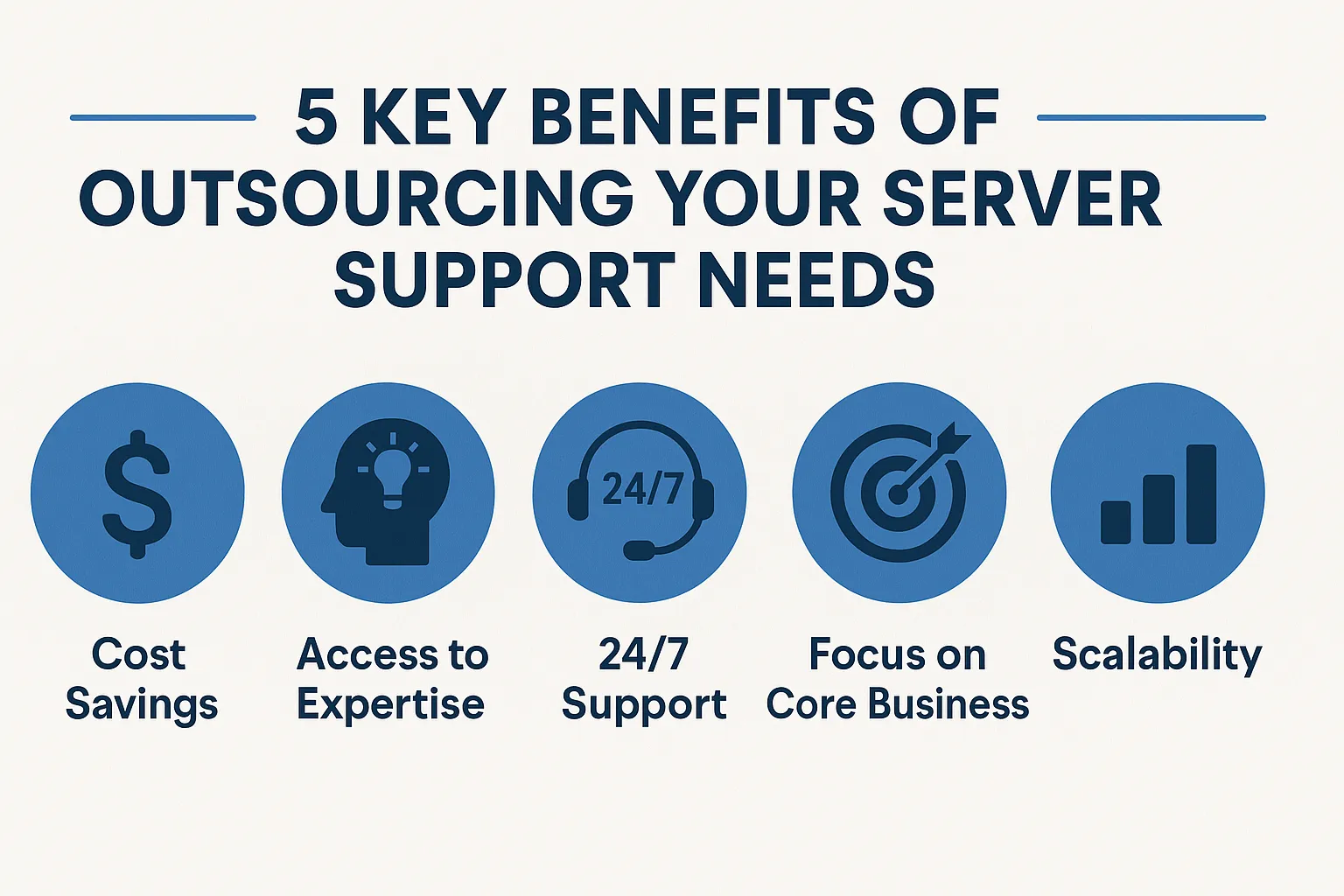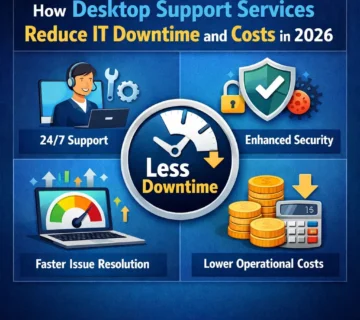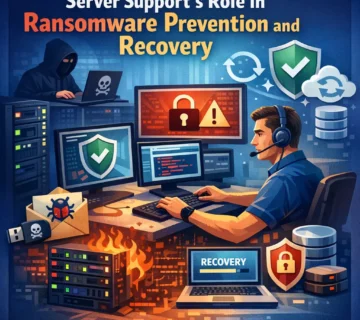5 Key Benefits of Outsourcing Your Server Support Needs

In today’s digital-first business environment, server infrastructure forms the backbone of nearly every operation. Servers host critical applications and store sensitive data. They keep businesses running smoothly around the clock. However, managing this infrastructure requires specialized expertise, constant vigilance, and significant resources that many organizations struggle to provide in-house.
Many businesses now explore server support outsourcing as a strategic solution. Partnering with experienced external providers ensures servers remain secure, optimized, and operational. This approach eliminates the burden of building internal IT departments from scratch. Growing startups and established enterprises alike benefit from understanding the advantages of outsourced server management. These insights help you make informed decisions about your technology infrastructure.
Let’s explore five compelling reasons why outsourcing your server support needs might be the smartest move for your business.
1. Substantial Cost Savings and Budget Predictability
Outsourcing server support delivers immediate and tangible cost reduction benefits. Managing servers internally extends expenses far beyond hardware purchases. You need to factor in salaries for qualified IT professionals. Continuous training programs add to costs. Employee benefits, recruitment expenses, and staff turnover all impact your bottom line.
Building an in-house server management team requires hiring specialists in various domains. System administrators, network engineers, security experts, and database managers all command competitive salaries. Finding candidates with the right skill sets can take months. Technology evolves rapidly, demanding ongoing investment in professional development. Your team needs to stay current with emerging trends and best practices.
Outsourcing transforms these variable costs into a fixed, manageable monthly expense. You gain access to an entire team of experts for a fraction of what one full-time senior administrator costs. This predictable pricing model simplifies budgeting. It allows you to allocate resources more strategically across other business priorities.
Outsourced providers operate at scale, spreading infrastructure costs across multiple clients. They invest in advanced monitoring tools, automation platforms, and management systems. These technologies would be prohibitively expensive for individual businesses to purchase and maintain. You benefit from enterprise-grade resources without bearing the full financial burden.
Hardware costs also improve with outsourcing. Many arrangements include regular hardware assessments and upgrade recommendations. This helps you avoid premature replacements or costly emergency purchases. Your provider can leverage their industry relationships to secure better pricing. Equipment and software licenses become more affordable. Those savings pass along to you.
2. Access to Specialized Expertise and Advanced Skills
Server technology has become increasingly complex. It encompasses virtualization, cloud integration, containerization, and security protocols. Countless other specialized areas require attention. No single individual can master every aspect of modern server management. Yet your infrastructure needs comprehensive oversight across all these domains.
Outsourcing gives you immediate access to a diverse team of specialists. These professionals bring deep expertise in their respective areas. They work exclusively in server management. Daily, they handle challenges and configurations that your internal team might encounter only occasionally. This concentrated experience translates into faster problem resolution. More sophisticated solutions emerge. Proactive optimizations improve overall system performance.
Effective server management requires extensive knowledge across multiple domains. Experts must understand operating system nuances across Windows Server, Linux distributions, and hybrid environments. Security specialists stay current with emerging threats and vulnerability patches. Database administrators optimize query performance while ensuring data integrity. Network engineers troubleshoot connectivity issues and implement robust failover configurations.
Outsourced providers maintain teams with all these specializations. They assign the right expert to each specific task. When a complex security incident occurs, specialists who handle security breaches regularly take charge. These experts don’t need to research solutions like generalists might. Performance tuning involves professionals who have optimized hundreds of servers. Their experience surpasses someone learning through trial and error on production systems.
Providers invest heavily in ongoing team education. They sponsor certifications and provide access to advanced training programs. Knowledge sharing across the organization becomes standard practice. You benefit from this collective wisdom. There’s no need to manage training logistics or bear associated costs.
3. Round-the-Clock Monitoring and Support Coverage
Server issues don’t respect business hours. A critical failure at two in the morning can be just as damaging as one during peak hours. Holiday weekend problems might prove even worse if they go undetected for extended periods. Providing true 24/7/365 coverage with an internal team requires significant overstaffing. Alternatively, it places unreasonable on-call burdens on existing employees.
Professional server support providers operate follow-the-sun models. Teams distributed across different time zones ensure qualified experts actively monitor your systems at all times. Sophisticated monitoring tools track hundreds of metrics continuously. These systems alert specialists to potential problems before they escalate into outages.
Proactive monitoring represents a fundamental shift from reactive troubleshooting to preventive maintenance. Instead of waiting for users to report email server downtime, monitoring systems detect unusual memory consumption patterns. Administrators address underlying issues before they impact operations. Backup failures get discovered through automated verification processes rather than during recovery attempts. Daily alerts notify administrators of any anomalies immediately.
Critical incidents make the value of constant vigilance especially clear. Minutes matter when something goes wrong. Having an expert already monitoring your systems makes a significant difference. These professionals know your infrastructure and stand ready to respond immediately. This quick action can prevent minor hiccups from becoming extended downtime. Such outages cost thousands of dollars per hour in lost productivity and revenue.
Business leaders appreciate the peace of mind professional monitoring provides. Servers receive expert attention even when internal team members are offline. Executives can travel internationally without worry. Employees take vacations confidently. Staff members disconnect after hours knowing server emergencies won’t go unaddressed until the next business day.
4. Enhanced Security and Compliance Assurance
Cybersecurity threats have grown exponentially in sophistication and frequency. Ransomware attacks, data breaches, and system compromises can devastate businesses financially and reputationally. Robust security requires constant vigilance and immediate patch management. Ongoing vulnerability assessments and deep expertise in defensive strategies are essential.
Outsourced server support providers make security their core competency. Dedicated security specialists focus exclusively on protecting infrastructure against evolving threats. These experts monitor vendor security advisories and track emerging attack vectors. They implement defense-in-depth strategies that layer multiple protective measures throughout your environment.
Patch management alone illustrates the security advantages of outsourcing. Critical security updates require prompt application. However, rushing patches into production without proper testing can introduce instability. Providers maintain test environments where updates undergo validation before deployment. They schedule maintenance windows that minimize disruption while keeping systems protected against known vulnerabilities.
Compliance requirements add another layer of complexity to server management. Healthcare, finance, and e-commerce industries face strict regulatory frameworks. These govern data protection, access controls, audit logging, and disaster recovery capabilities. Navigating HIPAA, PCI-DSS, GDPR, and similar regulations requires specialized knowledge. This extends beyond technical implementation to include documentation, reporting, and ongoing validation.
Professional providers bring extensive compliance experience from working with numerous clients across various regulatory environments. They understand what auditors look for during examinations. Documentation standards that satisfy regulatory requirements come naturally to them. Their expertise helps you demonstrate due diligence in protecting sensitive information. This knowledge proves invaluable during audits, potentially saving you from costly fines or corrective action plans.
5. Scalability and Business Agility
Business needs fluctuate over time. Seasonal peaks may require temporary capacity increases. New product launches might necessitate additional infrastructure. Market conditions could demand rapid expansion or consolidation. Managing these changes with an internal team presents significant challenges around hiring, training, and right-sizing your workforce to match evolving demands.
Outsourced server support provides inherent flexibility that aligns IT capabilities with business requirements. Additional servers to support new applications? Your provider can provision and configure them quickly without requiring new staff recruitment. Expanding into new geographic regions? Your outsourcing partner implements distributed infrastructure ensuring optimal performance for global users. Facing budget constraints requiring consolidation? Your provider helps optimize resource utilization without eliminating internal positions.
Scalability extends beyond just adding capacity. As your technology strategy evolves, transitions may be necessary. Physical servers might move to virtualized environments. Hybrid cloud architectures could become priorities. Containerized applications might enter the picture. Each transition requires different skill sets and expertise. Outsourcing providers adapt their services to match your changing needs. They bring in specialists with relevant experience rather than requiring you to retrain existing staff or hire additional personnel.
The ability to scale support up or down provides financial flexibility. During growth phases, increasing service levels happens without long-term headcount commitments. During slower periods, adjusting your service agreement replaces difficult decisions about layoffs or reassignments. This flexibility maintains IT capabilities matching current needs while preserving agility for future changes.
Additionally, outsourcing providers bring fresh perspectives and industry insights that inform your technology strategy. They work with diverse clients across various industries. This gives them broad visibility into emerging trends, best practices, and innovative approaches. External viewpoints help identify improvement opportunities that might not be apparent to internal teams focused on day-to-day operations.
Making the Right Decision for Your Business
Outsourcing server support represents a strategic decision that impacts your operations, budget, security posture, and competitive position. The five benefits outlined above demonstrate how external providers deliver superior capabilities. Enhanced reliability and better value emerge compared to maintaining purely internal operations.
Successful outsourcing requires careful provider selection. Look for partners with relevant industry experience and strong security credentials. Transparent communication practices matter significantly. Service level agreements should match your business requirements. Check references thoroughly. Understand their escalation procedures. Ensure cultural compatibility that fosters productive long-term collaboration.
The right outsourcing partnership transforms server management from a technical burden into a strategic advantage. Your organization gains freedom to focus on core competencies. Meanwhile, your infrastructure remains secure, performant, and aligned with business objectives. Technology continues evolving while cybersecurity threats grow more sophisticated. The expertise and resources professional providers bring become increasingly valuable assets in your digital strategy.







No comment